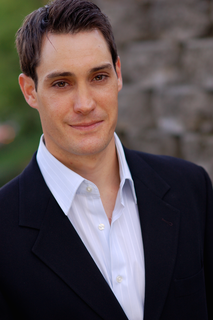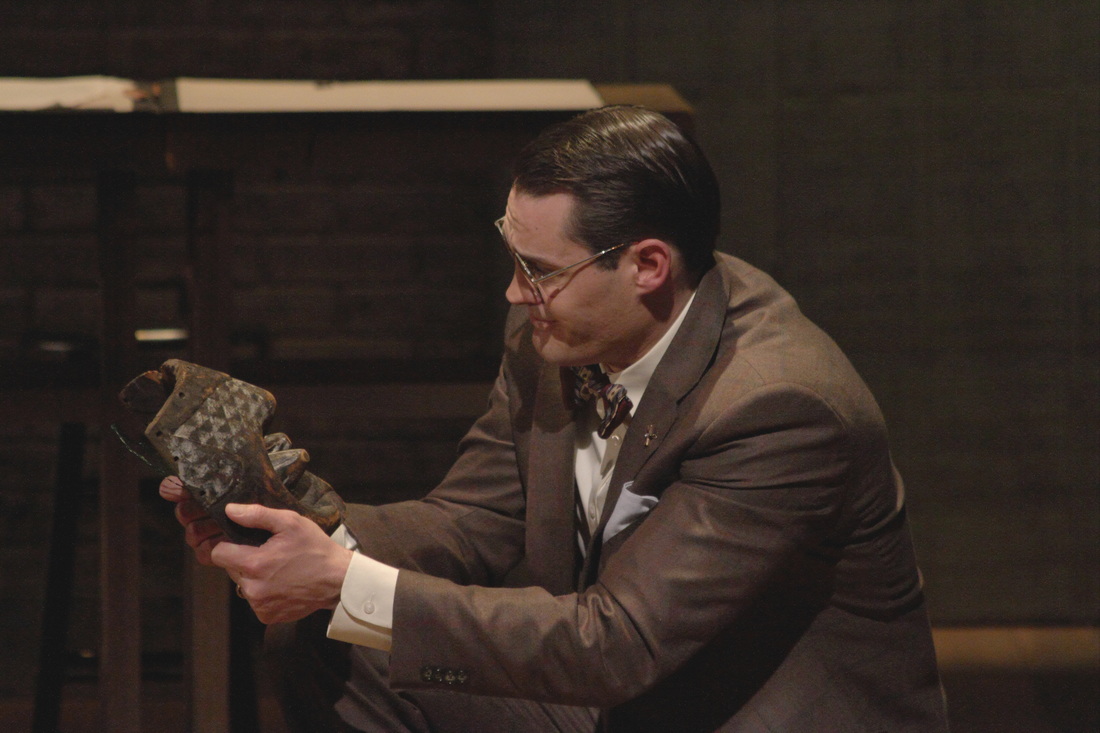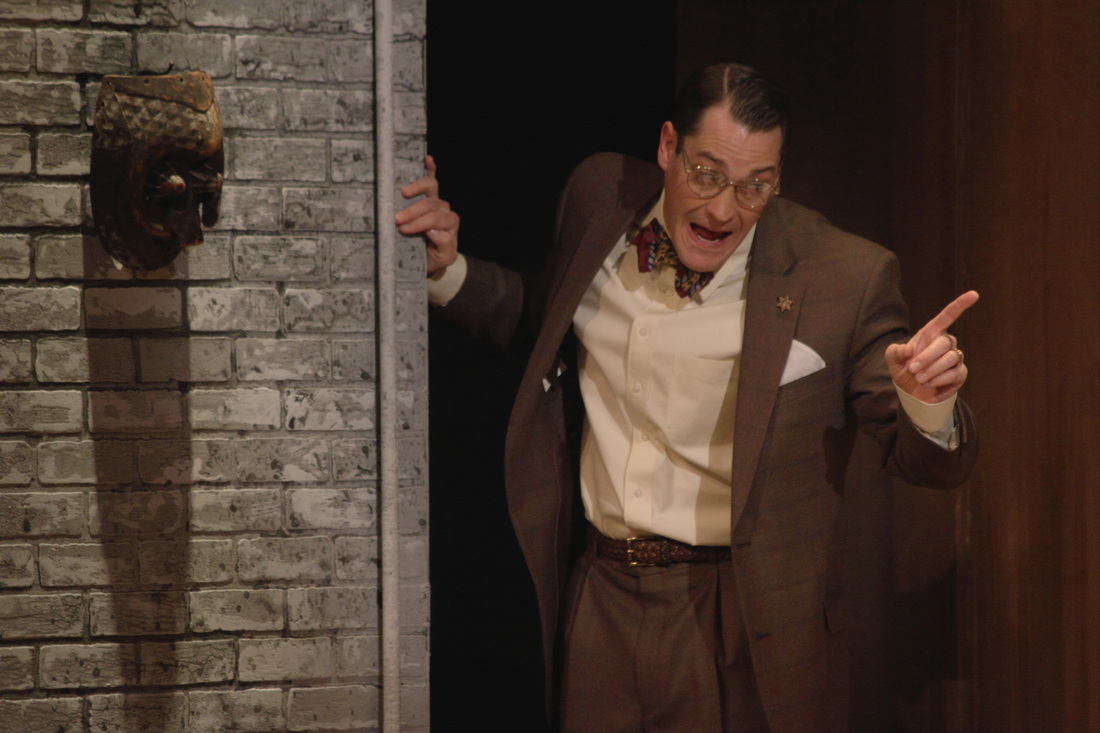 JACQUELINE LAWTON: To begin, why did you decide to get into theater? Was there someone or a particular show that inspired you? ADAM GREER: I got into theater more or less by accident... Literally. I played soccer up until high school but was unable to tryout for the team my freshman year because I had torn a tendon in my ankle. my brother was in the theater department an encouraged my to audition for the all school musical that year. I had been in the choir in middle school and thought I'd give it a shot. I remember, vividly, making my first exit after opening night: the adrenaline rush, the exhilaration was overpowering. I was offered a small role in the next play (William Saroyan's The Time of your Life) and never looked back. It was our high school drama teacher, Mike Harrison, who made all the difference. He instilled in all his students a reverence for the theater, a passion, a work ethic and drive that I've tried to carry with me all my life. JL: Set in Hampton, Virginia in the 1940s, THE HAMPTON YEARS examines the impact of World War II on Jewish immigrants living in the United States and their role in shaping the lives and careers of African American students in the segregated south.Why do you feel this play is relevant to today’s audiences? AG: First of all, the desire to create art, and the ability of art to question, reflect, or even change society is an universal and timeless necessity, it seems for humankind. we still struggle with bigotry and prejudice, and it is the duty of the serious artist to fight these battles. For me, being an artist is largely about finding and celebrating the universality of the human experience. If, as an actor, I can use my imagination, my personal history, and experience to "become" as much as is possible someone else, I can begin to understand another person's (even a fictitious person's) longings, struggles and point of view. In drama school, we spent several months our first year doing a text analysis project, where we worked through a rehearsal process and character study of a play that we would never perform. One of the plays was August Wilson's Fences. For me to work on the character of Troy was an unbelievable and incredibly challenging prospect. This is a role I can never play. It would be insulting and infuriating to see in a staged production and rightly so. While I learned that the experience of a young black man from that period is something I could never, ever, ever completely understand or encompass, just putting myself, to the best of my imaginative and artistic abilities, I hope, bridges the gaps in some ways. I've gone a bit afield. This play is relevant now because obviously the struggle to explode the barriers of race and culture that separate and divide us is ongoing. The experience of art and creativity may be universal, but the setting of this play (1940s Virginia) provides the filter of an exceptional crucible of pressures which shaped the world of art and creativity: The looming savage inhumanity of Nazis and the stark reality that here in the US, systemic racism and institutionalized segregation were rampant and ingrained. We see, I hope, not merely how things were, and certainly not how far we've come, but rather how much work we still have to do. JL: THE HAMPTON YEARS also investigates the various ways in which racism and bigotry negatively impact the arts, academia and military. Where do you feel we are in terms of race relations in the U.S.? AG: As I just stated, still so far to go... I feel we are at a volatile and crucial boiling point. A new and modern movement seems to be coalescing. As more and more police brutalities are brought to light and documented, the issues of race and violence can no longer be denied, or ignored by a privileged and unimpacted (and even oblivious or ignorant) majority. There is a sense of welling anger, which is as troubling as it is necessary. I feel that issues are taking a national spotlight and it is less possible to be neutral, and that people who were never in the conversation or struggle are taking part, and that will, I hope, be a vehicle for constructive change... At the same time it feels like we are on the verge of an eruption or upheaval which will be necessary but tumultuous. JL: Which character are you playing? What, if anything, do you have in common with this character’s passions, values, intentions or belief system? AG: I am privileged to be portraying Victor Lowenfeld. He is a driven and passionate scholar, teacher, and artist in his own right. His real life body of work is documented, so I will skip that here. I can say I admire his unrelenting mission to forge a pathway for his students as pioneering artists and representatives of their culture and history. He has suffered. He lost all but his immediate family to the Nazi scourge, and flees a society rife with horrors and the worst in humanity, only to arrive in a professed free society rife with resonances of the same institutionalized hatred and systematic oppression. Really I am using his intrepid resilience and willingness to start over, his overwhelming passion to begin anew and never quit as a personal inspiration. This is this first play I have been able to do in almost three years. As a father of three, my artistic career has had to take a back seat to my most important role: that of a grateful and proud parent. Viktor's seminal book, Creative and Mental Growth, which has been a standard for decades for art teachers and students, concerns the way children progress artistically and how their art reflects their psychological development. Spending the last eight years watching my childrem blossom and grow now feels now like extensive research into Viktor's mind. This year, as my kids have all begun their schooling, I came to the realization that after several years of dedicated fatherhood, I now have some time to re-dedicate to my career as an actor. I am in the process of rekindling my creative spark and the single minded determination, passion, and relentlessness that my character brings to his art and classroom serendipitously both mirrors and fuels my own JL:What do you hope audiences walk away thinking about after experiencing this play? AG: I don't want to manage the audiences thoughts. Art is inherently interpretive. I hope that they walk away not only thinking, but discussing their thoughts. I hope this play creates dialogue. I hope that the ideas of race, history, creativity, the process of creation, and whatever they may bring to the experience from their own lives collide, mingle, and become change, no matter how slight. JL: What’s next for you as an actor? Where can we follow your work? AG: I honestly have no idea. After this time away I am going to hug my kids in a desperate way they won't understand. I am going to take my wife to the Bahamas (no kids!). And I am going to try to keep the flame of inspiration I feel working on this rich and complex play burning bright in my artistic soul. Adam Greer has appeared on Broadway in Mary Stuart and Cymbeline (Lincoln Center). Other New York productions include Look Back in Anger at the Roundabout, Hamlet and Cymbeline at the Public Theatre/NYSF, What you get/Expect at NY Theater Workshop, and Straight Jacket, which premiered at Playhouse 91 and was subsequently made into a feature film in which Mr.Greer reprised his leading role. Regional highlights include Cabaret (Engeman), I Witness (MarkTaper), Rough Crossing (Old Globe), The Triumph of Love (Seattle Rep, Longwharf), Fly (Crossroads), It Pays to Advertise (Yale Rep), Agamemnon (Getty Villa), A Midsummer Night's Dream (PittsburghPublic), and several productions at the Guthrie Theatre including Julius Caesar, The Invention of Love, and Death of a Salesman (which traveled to the Gaiety Theatre as part of the Dublin Theater Festival). He performed at the Kennedy Center in An Evening of Romeo and Juliet with the National Symphony Orchestra, and other film and TV credits include Winter of Frozen Dreams, Law & Order SVU, Guiding Light, and As the World Turns. Mr. Greer is a graduate of the Juilliard School.
0 Comments
Your comment will be posted after it is approved.
Leave a Reply. |
My BlogI'm a playwright, dramaturg, and teaching artist. It is here where you'll find my queries and musings on life, theater and the world. My posts advocate for diversity, inclusion, and equity in the American Theatre and updates on my own work. Please enjoy!
Categories
All
Archives
June 2020
Reading List
|



